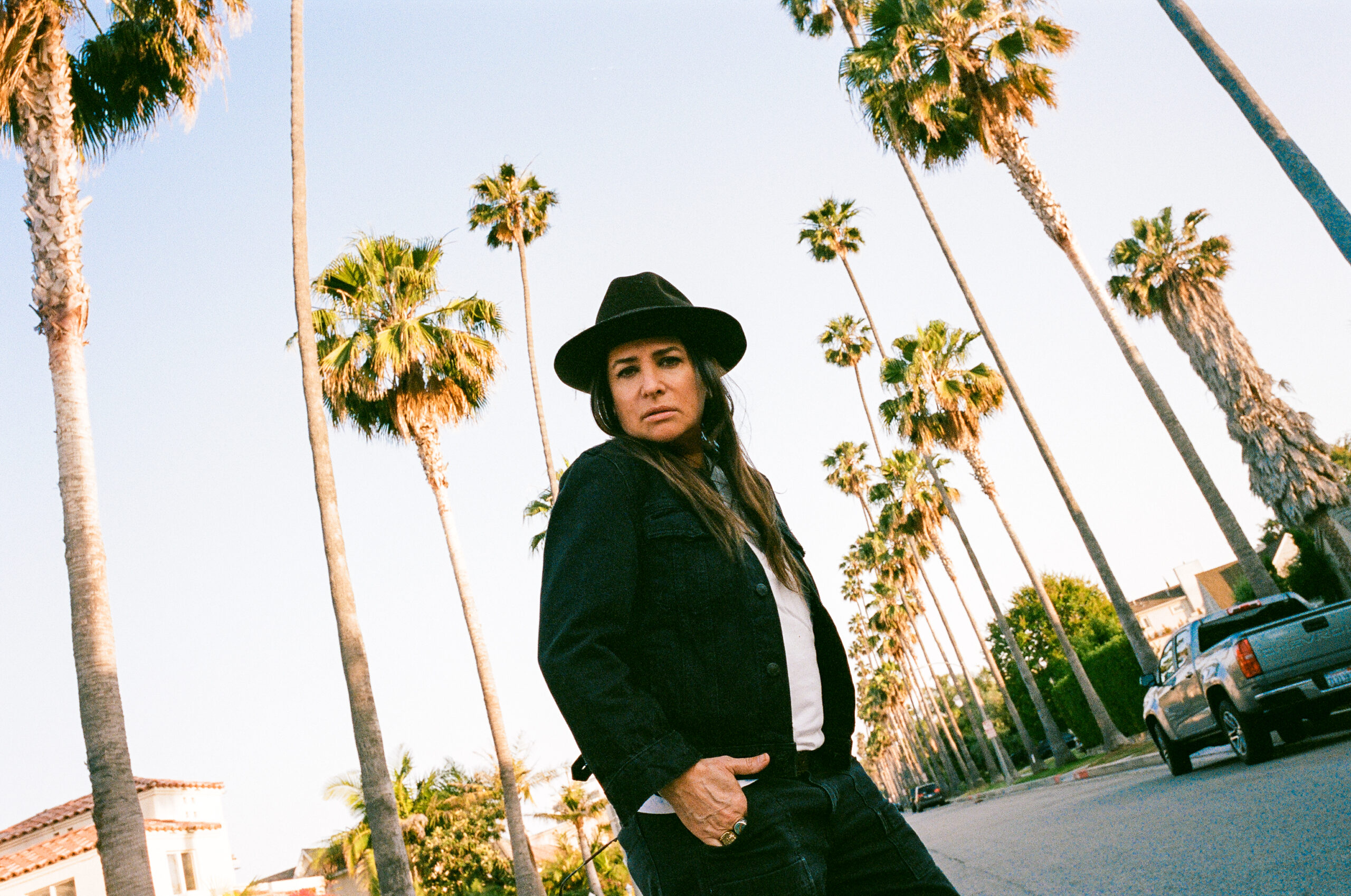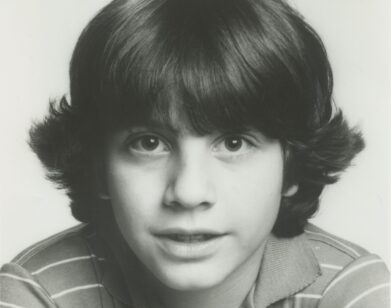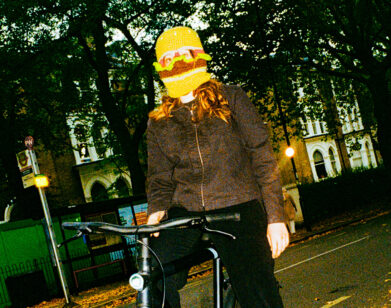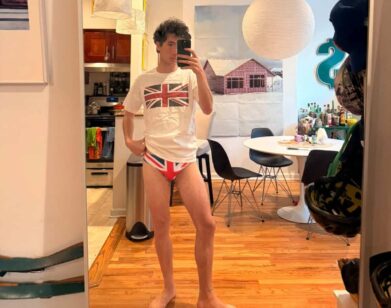DIRECTOR
“I’m Going to Lose My Fucking Mind”: Pamela Adlon, in Conversation With Lena Dunham
“Obviously, we could just talk and talk,” says Lena Dunham. We’re a half-hour into the writer-director’s Zoom with her kindred spirit Pamela Adlon and the pair has already covered lots of ground: two of Adlon’s three daughters made an appearance (“Say hi to auntie Lena”) and Dunham’s revealed that she used the name “Dolores,” an homage to Adlon’s character in the 1982 sequel to Grease, on her first fake I.D. That was Adlon’s acting debut, but the projects she’s tackled in the ensuing four decades stand as a testament to her enviable range and unflagging work ethic, from voicing Bobby Hill in King of the Hill to her roles in long-running television series like Californication and Louie. Better Things, the Peabody-Award winning show Adlon created, wrote, and starred in, established her, with Dunham, among a group of auteurs who used the raw material of their lives to make blistering art about the female experience. But it was not until this year that Adlon made her directorial film debut. Babes, a warm and exuberant comedy about female friendship starring Ilana Glazer and Michelle Buteau, is “the Superbad of motherhood if it was directed by Claudia Weill at Cannes in the ’70s,” Dunham raves. So last month, shortly after its theatrical release this, she talked to Adlon about moviemaking, menopause, money, and motherhood, among other things.
———
LENA DUNHAM: Pammy, Pammy, Pammy, Pammy.
PAMELA ADLON: I made you out of clay. Oh, Pammy, Pammy, Pammy. We want to roll in hay, hey!
DUNHAM: That’s how I feel. And you’re the only person I’d be comfortable interviewing from bed.
ADLON: I can’t even fucking believe that this is going to be our download. You’re 20 years younger than I am, or 40, and I have looked up to you for so long. And, I mean, the day we met was that—
DUNHAM: Do you remember where we met?
ADLON: At the WGA Awards in New York City.
DUNHAM: Yep. And I saw you and I screamed, “It’s you,” and you screamed, “It’s you,” and then you took me in your arms like I had been there for 47 years and held me. And then I kept coming and sneaking by your table again because I just couldn’t be away from you. That’s how I felt. And you were wearing a little suit and it was so inspiring to me because I was in some dumb dress that someone had told me that I had to wear. I was like, “Oh, you can be that bitch.” You can just show up in a suit and boots and be like, “What up?” and not dress yourself up in a dress with a peplum because some lady told you to. That’s your legacy. By the way, when I dyed my hair, the first thing I said to my husband was, “Do I look like Pam? I’m not going for goth. I’m going for Pam.”
ADLON: Oh my god.
DUNHAM: So, obviously, we could just talk and talk.
ADLON: Oh, you know what? I want to say this is so cool because Interview Magazine is such a huge part of my life. I collected every fucking issue obsessively. I still have one, to this day, with Grace Jones on the cover. It was everything. It’s the only magazine that survived. And I did a feature for Interview several years ago. I interviewed Lena Waithe and Lisa Joy. Anyway, this is cool.
DUNHAM: I know. So you know this, but the name that I put on my fake ID as a teenager was “Dolores” because of your character in Grease 2. It was also the name that I would use to call fake psychic hotlines. So she’s been with me for so long. We have Dolores, then Little Darlings, which I still play the theme song to every day when I’m going to set. Then we get into The Facts of Life, then we get into the Puberty Blues of it all. I mean, we’re not even going to get into FernGully and the voice–
ADLON: How old am I? I’m 78.
DUNHAM: No, you’re not 78. You’re everything. And I’ve had moments where it’s so funny because I’ll be like, “Oh, I worked with insert name of…’ and people are like, “Okay.” And then I say “I’m friends with Pamela Adlon” and people have these crazy emotional responses to you because they grew up with you. They have Dolores, and then they get to Better Things where you’re representing what it feels like to be a mother of your generation.
ADLON: This is so fucking cool. Please hold.
DUNHAM: I can’t wait to hold. I truly can’t wait.
ADLON: Oh, delivery from the bank. This is Rocky [Adlon’s daughter]. Rocky, this is Lena.
DUNHAM: Hi, Rocky. How are you?
ROCKY: I’m so good. Haven’t seen you in forever.
DUNHAM: I know. I miss you. What does your shirt say? “Don’t be mad at me when I’m mad at you.” You’re so cool, it’s annoying. How is life? Where are you? What’s going on inside your soul?
ROCKY: I have no idea.
DUNHAM: Okay, great answer.
ROCKY: I have not known what’s going on for a very long time now.
DUNHAM: Are you in school right now?
ROCKY: No, I dropped out of high school. Accidentally. Not my fault.
DUNHAM: But you know what? Cool.
ROCKY: Yeah.
ADLON: Gideon [Adlon’s oldest daughter]. Say hi to Auntie Lena. Really loud.
DUNHAM: Hi, Gideon.
GIDEON: Hi, everybody.
DUNHAM: Hi. Honey, I miss you.
GIDEON: I miss you too. I haven’t seen you in so long.
DUNHAM: Our guest room is always open to you.
GIDEON: I’m in London all the time now.
ADLON: Gideon’s got a boyfriend in London. Gid’s in love.
GIDEON: He’s on FaceTime with me right now, actually. It’s my boyfriend, George.
DUNHAM: Hi, George. What a pleasure. Gid, will you tell me when you’re here so that I can meet George and we can sit together?
GIDEON: I’ll be back in a few weeks and we’ll sit together. You’ll love George.
DUNHAM: I can’t wait.
ADLON: Can somebody go check on Nana again? We’re starting.
DUNHAM: Please tell Nana that I love her. Also, I remember once we were all sitting together and we were talking about a celebrity, he shall not be named, who did something rude to Gideon and she wasn’t talking it at all. And then quietly from the end of the table she went, “He should have been a chimney sweep.” And I think about it every day because it’s just like, she didn’t give a fuck. She was like, “He should have been a chimney sweep.”
ADLON: Oh my god.
DUNHAM: That’s the energy that I hope to bring into our interview.
ADLON: Lena, that is so you, because that moment would be gone forever if you hadn’t stored it. And that’s the shit that you and I do.
DUNHAM: Which is why we are going to make a TV show together and we’re going to figure out what it is because we explore the same kinds of things.
ADLON: Yes, please.
DUNHAM: I watched the film, I loved the film. What I love so much is that I’ve become used to seeing you in your own work. And I was like, “What will it be like to watch something that Pammy made that Pammy’s not in?” But I felt you in every frame, in every moment, because of the fact that you have this lifelong exploration of how women interact with each other, because of the fact that the movie talks about all of the parts of being born with a female body that nobody warns us about, because the movie is ultimately a love story between women, even though the men get to have their time.
ADLON: Thank you for that.
DUNHAM: But ultimately, at the end of the day, it’s about the way women see each other and show up for each other, which you and I have done many times. And when they miss each other, they decide to circle back and figure it out. That last moment where they’re looking at each other, not to give spoilers, that cracked me. It was just so beautiful that I could feel you on every frame. Yes, your style as director, yes, the speed of your humor, but also just in the subject matter. I was suddenly like, “Oh, of course. There she is. She’s in all of it.”
ADLON: Thank you. That’s beautiful. I love you.
DUNHAM: So here’s my question for you. You’ve directed a lot. You directed the shit out of Better Things. This is your first feature. What made you read this and go, “That’s the thing that I want to be a first feature. This is what I want to show up for.” You’ve been doing this work that is so directly personal. We’re basically watching aspects of Better Things move back and forth in the frame. People often mistake things that are personal for things that are diaristic and don’t realize the intensity of the structure and cinema. I know this because I know you. The level of structure and vigor and specificity and vigilance that you put into it is next level. But what made you want this to be the one?
ADLON: Well, I so appreciate that word “diaristic” because it felt so authentic and natural and my style.
DUNHAM: Cassavetes if he could nail a punchline.
ADLON: There you go. Better Things sometimes would get overlooked or just relegated to a place where it’s like, “Oh, but that’s your life.” I’m like, “Do you know how fucking hard it is to put this nuance and these layers and to create–”
DUNHAM: And to structure it.
ADLON: Like, this is not a reality show, bro. This is fucking hard work.
DUNHAM: It’s not The Osbournes. You’re making these incredibly specific choices and you’re building it. I think you and I both experienced it. Before I started making movies after Girls, people would say to me, “Have you ever directed before?” Because people were so focused on the idea that Girls was some direct reflection of what was happening in my bedroom that they forgot that that was actually my work as a person who cares about cinema. I think you dealt with that exact same thing. For me, it was a big deal when I had a chance to make something that stepped out of that zone. Because I was like, “Now I get to focus on these other aspects of the artistry that I’ve always cared about but other people haven’t been able to see because they were blinded by some sense that they were watching The Hills.”
ADLON: It’s insane because this is a very female problem. It’s like, “Oh, have you ever directed before?” Like, did you not see all these beautiful episodes that are movies in and of themselves? Did you do Tiny Furniture before you did Girls?
DUNHAM: I did. I made two little features before Girls, but they were so small and, again, I think it’s very easy for the conversation to be focused on gossip. They’re interviewing you like, “So you’re single and you’re dating in L.A.” They’re honing in on what they see as the most gossipy truths of your life. Whereas if I had the chance to interview you, I’d be like, “How did you think about where you put the camera in the kitchen so we could feel everybody moving around behind the frame like we were in the fucking wedding scene in Deer Hunter?”
ADLON: “Look at this drone shot over the Florida Keys.”
DUNHAM: You make directing look easy, which is the hardest thing in the world to do.
ADLON: Thank you, man. Also, I want to talk about Treasure [Dunham’s new film, directed by Julia von Heinz] and I’m dying to see it.
DUNHAM: I’m going to send you a link.
ADLON: I’m going to lose my fucking mind. You and Stephen Fry?
DUNHAM: I mean, what you’ll connect with is that it’s intergenerational trauma central and that’s something that you and I have spent a lot of time talking about, but it ain’t about me. By the way, you’ll love that I posted an ode to my grandparents today and then got pages of notes from my mom and her sisters on my Instagram post where they were like, “Actually, Grandma Mildred was quite tough and she didn’t wear lipstick.” And I was like, “You know what, bitch? You write your own Instagram post.” The family group chat of all the Jewish aunts and moms being like, “Thank you so much. This made me cry. But actually, everything you said about your grandparents is inaccurate.” Anyway, so what was the thing about Babes that made you go, “This is my movie.”
ADLON: So in the first place, they wanted me. I’m easy. Okay?
DUNHAM: “I’ll do it tomorrow.”
ADLON: Yes, exactly. I thought the script was great. And you know how hard it is to create a script. When something comes to you from other people, you’re like, “Oh, shit. I’m going to have to rework and rewrite this whole thing.” And I didn’t have to do that with this script. I loved the characters. I loved the romance between the two women. I remember I used to look at social media when Better Things was on the air, and I think it was the finale of season four or something where I do this testimonial about women in the shadows. I was talking about menopause and our bodies being like a Philip K. Dick thing because they’re filled with so much shame. And how I shot that is, I just put out to the crew and the cast or anybody, “If any women want to come in, we’re going to have a camera set up all day, and if you want to share your story, I’ll be here in this room and we would love to have you.” And my friend, Nell, flew in from Brooklyn to do hers, and it was just incredible.
DUNHAM: Also, as a postmenopausal 38-year-old, I’m especially appreciative because when I watched that show, it was so wild to me. Because for a lot of my friends, it was what was ahead, but everything you were talking about, I was like, “This is what’s happening in my body right now, and none of my friends understand. Also, no one fucking warned me.” And this movie has that same thing, which is that “no one fucking warned me” aspect of being born with a female body. I remember for like, four years, my dad was like, “Your mom’s in a bad mood. Just go lightly on her.” And it wasn’t until last year that I was like, “She was in menopause.” It was literally four years where my dad was like, “I wouldn’t push her on that.” And I was like, “What’s going on?”
ADLON: It’s one of those things that something triggers you in your present life and you’re like, “Oh, my god, my mother was in menopause.”
DUNHAM: Well, it was when I just had my ovaries removed and I tried to put my sock on and the seam was on backwards and I started to cry hysterically. And I think people think that because of Girls I have a much more uneven emotional reality than I do, but I walk through most days pretty delighted. So when my sock seam was turned around–
ADLON: Honey, you were 30 fucking years old.
DUNHAM: Correct.
ADLON: And do you want to know the craziest thing? What did I ask you to bring me that day that you came to my office apartment in Beverly Hills? I was out of something and you came and you brought me a box of?
DUNHAM: Estrogen?
ADLON: Tampons.
DUNHAM: [Laughs] I forgot. You did ask me that. And you know what was the funniest thing? I’d already had a hysterectomy, so I had to go pick them up. And I remember being like, “I haven’t done this in a while.” You gave me a gift.
ADLON: Those were my last tampons.
DUNHAM: I mean, I love you so much, but those were my last tampons too. And should I be so lucky to have a daughter and should she be so blessed to get her period, it’s going to literally be me being like, “I haven’t seen one of these in 38 years.” The things that nobody says that I’ve seen now with my friends who are having children, no one talks about what’s going to happen to your body and no one talks about what’s going to happen to your soul. And there’s that beautiful moment in the movie where they go to the hotel for the baby moon and Michelle [Buteau] bops on the bed and Ilana is super pregnant, and she lies down and can barely scoot up the bed. One of them’s luxuriating in the space and one of them’s like, “I can’t even appreciate a fucking bed anymore,” and you shot it with this beautiful, simple camera angle.
ADLON: Yeah, that’s Jeff Kim, my DP. He surprised me. We have different backgrounds and he’s a very by-the-book film school guy. I am very punk rock. I didn’t get into film school, so I rented every videotape at my video store in West Hollywood. And the two of us together, that was magic. But some days I would be like, “When he leaves the shot, can we just keep moving?” And he’s like, “No, Jupiter.” Because they all call me Jupiter, that’s my name now. So he goes, “No, Jup, we can’t turn the camera because it’s crossing the line.” I’m like, “Jeff, I swear to god, it’s going to be okay. Just move the camera over.”
DUNHAM: If you knew how often I said to people, “I don’t care about the line.” And finally, my script supervisor on the show we just did just stopped telling me, because she was like, “She’s not going to listen.” Because there’s always a way to figure it out.
ADLON: Because we don’t know from the line. So when I’m shooting and they’re like, “Are you sure you want them to look right down the barrel? Don’t you want them to look right on the eyebrow, right outside the lens?” And I’m like, “I don’t know. Let me experiment with that.” I just still have the mentality as a director and a filmmaker that I’m knocking on wood that I get to do it. I’m stealing shots. I’m stealing everything. Somebody sees me with my Super 8 camera that I rented from Yale Labs in Hollywood, “Do you have a permit to film here?” And I’m like, “Oh, I’m a USC film student and I’m doing my…”
DUNHAM: I didn’t have a single permit for all of Tiny Furniture. Apologies to everyone. I knocked on someone’s door and said, “We’ll give you $30 if we can get on your roof.” And they were like, “We don’t need your $30. Good day.” I think if that’s how you start, that’s how it stays. You started acting so young and you were on big fucking sets as a little kid. A lot of people would’ve gone, “Okay, this is how movies get made.” What do you think it was that made you go, “Okay, I’m watching the preeminent men of Hollywood raise a camera on a crane, but I, Pammy, am going to punk it up and treat it like we’re doing New Wave”?
ADLON: I’ve said this many times, I just wish I wasn’t so myopic when it came to my professional career. I stayed in my lane. I just wait for the phone to ring for an acting job. But I was always curious and obsessed with everything that was going on behind the camera. I was in a fucking Jack In The Box commercial and William Fraker who shot Close Encounters of the Third Kind was the DP. When I was 14 or 15 years old, I did the pilot of Little Darlings that never saw the light of day. I remember we were on a soundstage at Paramount, we were about to have a food fight, and Garry Marshall walks in. We’re just this bunch of little teenage girls sitting at this table about to fuck each other up with food. And Garry Marshall goes, “Oh, are you guys having a fun day? Listen, this stage is very special. We shot Laverne & Shirley on this stage.” And I feel like he was blessing us at that moment.
DUNHAM: And by the way, I love the fact that your first movie is directed by a woman. When I look at your career, in a way, it’s less about that punk attitude and more about you waiting for popular culture to accept the kinds of stories that were interesting to you. And what I’ve always found so interesting about your acting career is that you’ve used this crazy gift that is your voice, both literally and figuratively. You know that actor Martin Mull? Who’s like, “Really, I’m a painter.”
ADLON: I did my second movie with Martin Mull and Karen Black.
DUNHAM: I mean, that’s too much for me to even fucking handle. I’m going to watch it today. But Martin Mull’s thing is, “I show up to act, I hit my marks, and it lets me go home and be a painter.” And in a way, you’re like, “I show up to act, I hit my marks, and it lets me go home and write.” Then, there was a moment where the two things converged and you got to make Better Things.
ADLON: I mean, this is what I say to the girls and all their friends, all of my little mentees—
DUNHAM: I don’t know how you have time to be the neighborhood mom. Every time I pass your house, there’s five cars parked and the dog walking truck that one of the boys shows up in. I was like, “Why is there a dogcatcher’s truck in front of Pammy’s house?” But it’s the beauty of your home. Anyway, back to your little mentees.
ADLON: Oh, yeah. The times are different now, and there’s got to be something about you that somebody wants to tap into. Everybody’s struggling to be relevant today. When I was in my 20s, I lived in a place that I owned. How the fuck is that going to happen for these kids? These kids can’t even get an apartment to rent. So I’m like, “You’ve got to go make some money, but also figure out the thing that you want.” I don’t have a line for my kids. I want them to keep moving forward and feel happy and feel like the world isn’t crushing down on them. I don’t want them to be scared existentially.
DUNHAM: Which is obviously an insane challenge in the world that we live in. Obviously, America’s a country that’s not offering anybody a particular boost. People just have to find a thing that makes them feel useful and create a safe space for themselves. Because you’re right, it’s so easy, especially for anyone who isn’t a cis white dude, to feel like the world is designed to crush them, because in so many ways it is. But now, you’ve directed a feature, I know my experience with Girls, and I feel like you must’ve had this with Better Things, that there’s this off-ramp experience. You’re writing, then you’re shooting, then you’re editing, then you’re promoting. It’s a cycle and it defines your life, and there is a regeneration and a re-understanding of your own artistic purpose that has to happen when it’s over. Looking at the next period of your life, you have beautiful children who are growing into remarkable people. You have made this show that has changed the way people think about themselves and their lives. What are your dreams for what your creative life looks like? I’ll ask about your personal life when we’re on a private call, baby.
ADLON: Well, I can sum up one thing. Before I directed the movie, I directed a bunch of commercials for this period underwear called Thinx—-
DUNHAM: I missed the boat on Thinx because my period stopped before it really rose to prominence.
ADLON: Well, I did that, which was great, then I did the movie. This interview is basically the last thing I’m doing for Babes. I am done with press right now, literally.
DUNHAM: We’re basically raising a glass right now to Pam’s wide open road.
ADLON: The weird thing is that it looks like, “Oh my god, she’s been going so hard.” But you have time to live your life. I made a promise to myself when I had three little kids and being a single mom to them, I said, “I’m not going to ever throw too many plates in the air that they’re going to fall.” Like, “I’m going to take on what I can handle.”
DUNHAM: And you have to be able to hear your own voice again in order to write your things.
ADLON: That’s right.
DUNHAM: The noise at home will never die down, but you have control over what the rest of the noise looks like.
ADLON: Yeah. I think that the biggest challenge was that the strike happened. I had a beautiful office and I had four wonderful employees. I couldn’t do it anymore. I had to get rid of that office and I’m down to two employees and my office is now back home, with my white board in the back room.
DUNHAM: It’s also good for people to hear that from you, because I think so many young people who are starting out felt so disillusioned by the strike and think that you reach some apex where suddenly those things don’t affect you anymore. And it’s good for people to know that someone working at the highest level still experiences the ups, downs, and shifts of this business.
ADLON: That’s right, it’s true. And the challenge of having my office here is that mornings are holy. I don’t know if it’s that way for you. When I go to sleep at night, I sleep, I punch my timecard, and then I go to work. Everything is flowing through my head and then I wake up. And I made a promise to myself that when I have an idea, I do not say, “I’ll write that down later,” I get out any piece of paper or I get out my phone and even if I’m sleeping, I’m like, “This is the song that’s in my head.”
DUNHAM: That’s what it has to be. When we’re younger artists, we’re like, “Someday I’ll make a sci-fi and someday I’ll make this and someday I’ll make that.” And then there’s this moment where you’re really like, “Every one of these projects takes something out of me, and I only have so many that I can make in this precious and holy life.” It’s not a supermarket sweep anymore. I’m looking at each one like, “Is this worth giving up—”
ADLON: The next two years of my life.
DUNHAM: And when I commit, I don’t just commit.
ADLON: There’s no light touch with these ladies.
DUNHAM: There is no like, “I guess I’ll bop in and out of there.” And by the way, this movie, Treasure, there’s some people who have loved it and there’s some people who haven’t understood it. I do not need praise or validation. The only time I ever give a fuck about people’s feedback is if I think that I didn’t give it everything that I had.
ADLON: Absolutely.
DUNHAM: The good news is that everyone loves Babes. And I think it’s going to become iconic in the way that certain movies about friendship have the potential to become iconic, whether it’s Bridesmaids or Superbad. You made the Superbad of motherhood, which is not something that I knew could happen. You made the Superbad of motherhood if it was directed by Claudia Weill at Cannes in the ’70s. So… that’s my bitch right there.
ADLON: I just got hard.
DUNHAM: I’m going to call you this weekend so I can talk to you about private things, and also to ask you some questions about how someone’s supposed to attempt to be a mother, build a home, and be kind to people while also making art. Just casual stuff like that.
ADLON: Totally. Nothing heavy. Nothing loaded there.
DUNHAM: I love you. You complete me.
ADLON: Thank you for doing this. I might be coming to London soon. Are you going to be there all summer?
DUNHAM: Yeah, I’m waiting for you.
ADLON: I love you.
Babes is now available on PVOD.







